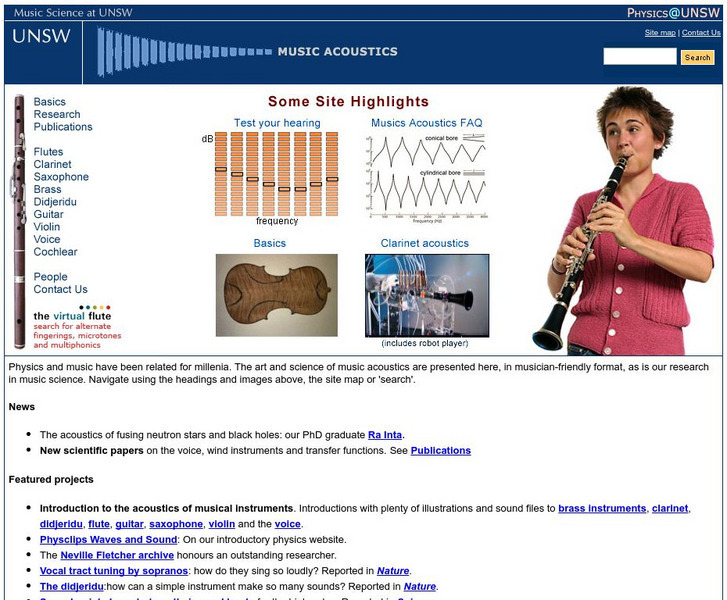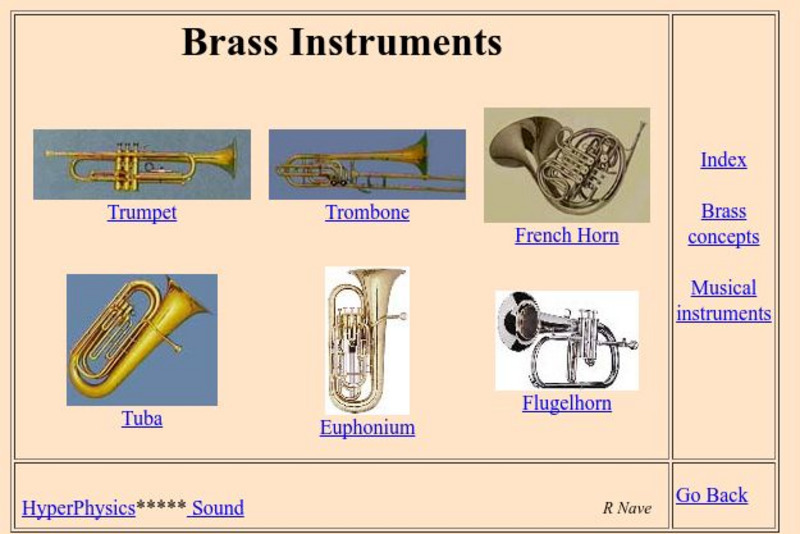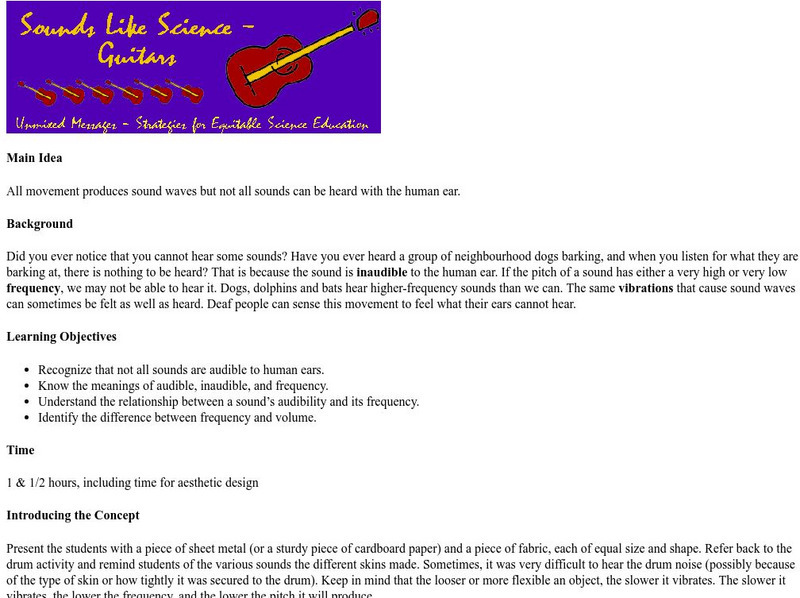Hi, what do you want to do?
Khan Academy
Khan Academy: Analyzing the Interference of Sound Waves and Beats
A site for students to practice viewing two sound waves interference and analyze the patterns formed.
University of New South Wales (Australia)
University of New South Wales: Music Acoustics
Learn about the science of music acoustics. Topics such as how do violins change with age and brass acoustics are explored through scientific research.
University of New South Wales (Australia)
University of New South Wales: Introduction to Acoustics of Brass Instruments
Discover the acoustical properties of brass instruments from this well researched site provided by the University of New South Wales. Everything from lip control to bell shape is discussed as it applies to frequencies and harmonics.
University of New South Wales (Australia)
University of New South Wales: Introduction to Saxophone Acoustics
Learn all about the ways a saxophone produces sound. Discover why the reed, playing softly or loudly and tone holes play important roles in this instruments acoustics.
PBS
Pbs: The Music Instinct: Good Vibrations! [Pdf]
Using the program "The Music Instinct," available on the PBS website, students will explore the nature of sound vibrations over two class periods.
Physics Classroom
The Physics Classroom: Sound Waves and Music: The Doppler Effect and Shock Waves
This physics tutorial focuses on the application of the Doppler effect to sound.
Physics Classroom
The Physics Classroom: Sound Waves and Music: Resonance
The focus of this physics tutorial is on the application of mathematical relationships and standing wave concepts to musical instruments in three general categories of instruments: instruments with vibrating strings, open-end air column...
Physics Classroom
The Physics Classroom: Sound Waves and Music: Guitar Strings
A guitar string has a number of frequencies at which it will naturally vibrate. These natural frequencies are known as the harmonics of the guitar string. Students work through several example problems.
Physics Classroom
The Physics Classroom: Sound Waves and Music: Standing Wave Patterns
Elaborate on the essential characteristics and the causes of standing wave patterns and relate these patterns to the vibrations of musical instruments.
Physics Classroom
The Physics Classroom: Sound Wave and Music Table of Contents
Learners investigate the nature of a sound wave, sound properties, resonance, musical instruments, and standing waves. The tutorial consists of lessons and problems to check for understanding.
Physics Classroom
The Physics Classroom: Sound Properties and Their Perception
The concept of pitch and frequency is covered in this tutorial. Learn what frequency and pitch are, the difference between infra sound and ultrasonic frequencies, and how pitch is related to the frequency of a sound.
University of New South Wales (Australia)
University of New South Wales: School of Physics: Physclips: Interference
Physiclips thoroughly presents the concept of interference with animations and film clips. Learn about linear superposition, beats, and consonance in this learning module.
Georgia State University
Georgia State University: Hyper Physics: Brass Instruments
Understand the science of sound when performing with a brass instrument such as a trumpet or a trombone.
Georgia State University
Georgia State University: Hyper Physics: Musical Instruments
Homepage for a hypertext about the different families of musical instruments. From this page, users can retrieve information on a the acoustics of a variety of specific instruments: stringed instruments, woodwind instruments, brass...
The Franklin Institute
Franklin Institute: Music to Our Ears
Discover the connection between sound waves and hearing with this webpage tutorial. Be sure to click on the picture for detailed information.
Michigan Reach Out
Sounds Like Science: Guitars
At this site explore the relationship between audibility and frequency of sound, and the difference between frequency and volume.
Other
Avatar Consultants, Inc: Definition of Intensity
Power, loudness, and decibel levels of sound waves are described and explained. The relative power output of various musical instruments is given.
Physics Aviary
Physics Aviary: Wave on String Lab
This lab is designed to help students discover the connections between the linear density of a string and the tension in the string with the speed of the wave along the string. The program can be set with six identical strings or six...
CK-12 Foundation
Ck 12 Exploration Series: Simulations: Physics: Pan Flute
[Free Registration/Login Required] A simulation to learn about wave harmonics in a column of air by looking closely at the sound produced by a pan flute.
Physics Classroom
The Physics Classroom: The Human Ear
Informative article on the human ear. Describes the parts and function of the ear. Explains how the ear functions when listening to music.
University of Kentucky
The Physics and Math of Music
Read about a math research project done by three college students which helps us see physics and math in music. Here's a great approach for integrating curriculum!
Georgia State University
Georgia State University: Hyper Physics: Sound and Hearing
Home page for a hypertext course on physics. Accesses a range of topics from hearing to sound measurement to sound propoation to musical instruments.
CK-12 Foundation
Ck 12: Physics: Waves Study Guide
[Free Registration/Login may be required to access all resource tools.] This guide gives a detailed overview of mechanical waves and the characteristics of waves. Covers wave behavior, including types of interference, resonance, and the...
Other
The Equal Tempered Scale & Peculiarities of Piano Tuning
The author offers a complete explanation of the physics behind piano tuning and why piano tuning is an intricate process. Illustrations and graphs are included.









![Pbs: The Music Instinct: Good Vibrations! [Pdf] Lesson Plan Pbs: The Music Instinct: Good Vibrations! [Pdf] Lesson Plan](https://content.lessonplanet.com/knovation/original/32599-2e1d15a712acffd6c74d979ac6bcf592.jpg?1661522343)







